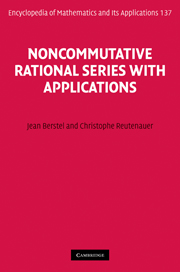Preface
Published online by Cambridge University Press: 05 June 2013
Summary
Formal power series have long been used in all branches of mathematics. They are invaluable in algebra, analysis, combinatorics and in theoretical computer science.
Historically, the work of M.-P. Schützenberger in the algebraic theory of finite automata and the corresponding languages has led him to introduce noncommutative formal power series. This appears in particular in his work with Chomsky on formal grammars. This last point of view is at the origin of this book.
The first part of the book, composed of Chapters 1–4, is especially devoted to this aspect: Formal power series may be viewed as formal languages with coefficients, and finite automata (and more generally weighted automata) may be considered as linear representations of the free monoid. In this sense, via formal power series, algebraic theory of automata becomes a part of representation theory.
The first two chapters contain general results and discuss in particular the equality between rational and recognizable series (Theorem of Kleene–Schützenberger) and the construction of the minimal linear representation. The exposition illustrates the synthesis of linear algebra and syntactic methods inherited from automata theory.
The next two chapters are concerned with the comparison of some typical properties of rational (regular) languages, when they are transposed to rational series. First, Chapter 3 describes the relationship with the family of regular languages studied in theoretical computer science. Next, the chapter contains iteration properties for rational series, also known as pumping lemmas, which are much more involved than those for regular languages.
- Type
- Chapter
- Information
- Noncommutative Rational Series with Applications , pp. xi - xivPublisher: Cambridge University PressPrint publication year: 2010

